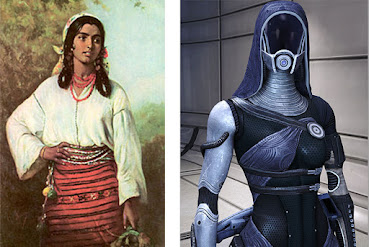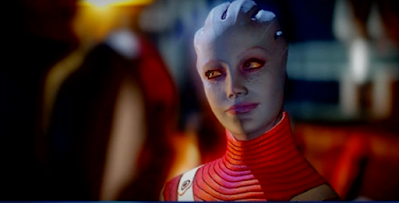Quarians - A Mish-Mash Of Middle East Tropes
By Ephraim Belnap
(This is part of my ongoing series about the world of Mass Effect)
Quarians - what's their deal?
As one of the most visible yet minor races in Mass Effect they get a lot of attention, but their origins aren't examined as much. Interestingly, their race gets a lot of real-life negative attitudes in-universe, as they're perceived as being both refugees, ascetics, and perpetrators of a notorious war. Players are likely to be quite fond of their quarian teammate, but that alone doesn't help us understand the range of influences the race draws from. Interestingly, it seems that the quarians draw their influence from a number of Middle Eastern and Central European countries, and how those influences are remixed shows the depth and breadth of the writers' understanding.
Before we continue, it's worth noting that I minored in Middle Eastern Studies in college and have been to and lived among most of the communities I'm going to discuss here. There's gonna be some thorny issues, but we'll talk about them right.
Space Roma
The most obvious influence for the quarians are the Roma - what are sometimes called gypsies, although they allegedly don't like being called that. The Roma are a traveling community in Europe who originate from the Middle East and South Asia, but don't have a fixed homeland. You can see them in stories dating back hundreds of years, and there are a number of prominent tropes rising out of them, such as the fortune-teller or the conman. As you might expect, tropes like that aren't the most encouraging, and the Roma haven't had an easy time of it. There is the stereotype of the Roma being conmen or thieves. Like a number of traveling communities, it's easy to blame stuff on them because they're a small enough community that you can pick on them easily and you can then solve the problem you're blaming them for by driving them off. All of which is good for you, but not very good for them. This will come up later.
Similarly, the quarians don't have a fixed homeland at present, since their planet is inaccessible. They live in a giant flotilla of ships they maintain well, and it moves around as necessary, with the inhabitants using a mix of martial law and democracy to maintain stability. But their habit of moving through different systems makes it easier for local communities to accuse them of some malarkey. In Mass Effect 2 you witness this directly. A businessman bumps into a quarian, immediately checks his pockets, doesn't find his credit chit, and assumes she stole it. You come across the aftermath where he's called a cop, then poke around and find out he just left it in a shop and is just jumping to prejudice as second nature. Heck, when you return the chit to him, he refuses to apologize for accusing her. Versions of this prejudice arise throughout the games, and players often make this connection first in their playthroughs, but the truth is the Roma connection is actually the least of the influences the quarians have.
Space Muslims
An observant player will likely make this connection second - the quarians have a marked resemblance to the devout wearers of the hijab - the veil or covering that some branches of Islam encourage the women to wear. Like any other item of clothing, the hijab can change from country to country; a veil, a mask, a hood, a complete covering. The general rule is that the hair must be covered, as a religious symbol of modesty.
The religious and cultural issues surrounding this are too thorny to get into here, but they're a whole thing. Mass Effect deviates from this by having males and females wear them - although head coverings are hardly uncommon in Muslim countries - and by making them more colorful than hijabs typically are. In this, there is again an element of Roma, as colorfully patterned headscarfs are common. But in truth, headwraps are common throughout the Middle East, and come in a variety of colors. The metatextual reason for this apparel is the nature of quarian biology - as a species with failing immune systems, they must remain in their exosuits at all times, but they need to look visually distinct in some way. But in-universe, their increased elaboration is justified as concealing their exosuit apparatus - similar to the real-life reason - and as valued traditional practice. As a currently nomadic culture, clothing is a meaningful signifier of their history that's likely to endure, so it is more elaborate and detailed than regular clothing. The tradition of sacred clothing has a rich tradition in other Middle Eastern religious groups, such as Judaism and Sikhs. But we'll get to that in a minute.
Space Jews
Skirting controversy now, the quarians are also similar to traditional Jews. This will likely occur to players quickly since their premise is that they don't have a homeworld and are trying to take it back. Their status as wanderers is very like Roma, but it's also very like traditional Jews, who have wandered Europe and the Middle East for centuries while maintaining a distinct culture. This influence is obvious if one knows any Hebrew, as the names of the quarian crewmate, half the quarians, and every celestial body in the quarian system has a Hebrew name. Tali, Raheel, Uriyah - a prayer given in the second game is even a direct quote of a Hebrew prayer - "Blessed are the Ancestors/Lord Our God, who kept us alive, sustained us, and enabled us to reach this season."
Like traditional devout Jews, the quarians have a reputation for unity and community, and their homeworld even bears a distinct resemblance to the country of Israel, with the vegetation resembling the olive trees dotting the country. The references are certainly obvious, but not conclusive.
Space Palestinians
Embracing the controversial option, we now arrive at the last parallel. The Israeli-Palestinian conflict aside, it is surprising how much of the story seems to parallel the real-life debates over the land of Palestine. The premise of Mass Effect in-universe is that the quarian home planet was abandoned when the quarians were pushed out by another species. But since said species were artificial intelligences originally created by the quarians as a labor force, the dynamic is decidedly different from the Israeli-Palestinian dynamic. It has more in common with the 1800's slavery of the United States or other slave-holding countries, where the tension came from a forcefully created slave class wanting emancipation. As such, it feels different enough that I don't feel like I'm ruffling any feathers by making this parallel. The Israeli-Palestinian conflict is such a complicated thing that I don't feel comfortable talking about it in its entirety casually, but there is another parallel where it feels similar, in that the way the quarian conflict is characterized by the leaders and ultimately solved feels very Palestinian.
From an outsider's perspective, the Conflict can seem foolish because "why can't they just get along?" But like marrying into a complicated family, events have already been in motion for a while, and you can't just slap some peace and love onto it and call it a day. Partially because that's not the only thing needed, and partially because there are so many opinions to cater to, which the quarians capture wonderfully.
Just as with the Palestinians, to the quarians the question of their homeland is the most occupying question of their time, intractable from choices as a leader or civilian. And just like the Palestinians, there are a wide range of opinions presented in the game. They have the pacifists who don't think it's wise to mess with the people that forced them out. They have the nationalists who are frustrated by generations of exile and just want to return home. They have the pacifists who encourage negotiating with the other party (although that has its own pros and cons); and they have the hardcore xenophobes who say they oughta drive the other party out with force and screw what they think. And thus the difficulty of creating a winning solution is a bit more obvious, both in-game and -out.
In the game itself, it is possible to broker a peace between all sides, but it's one of the more complicated achievements in the trilogy and a good number of players don't manage it. And since it's a videogame there are finite details to ruminate on, whereas real life can be more complicated. The reality of international cooperation isn't simple, even when you're positioned as someone powerful. And it takes a lot of precise communication and - in the case of the video game - a massive existential threat in the form of robot squid aliens to make it semi-plausible. Is there a position on the real-life Palestinian/Israeli Conflict in there? Maybe, but it primarily feels like it's meant to illustrate political realities; you can't make everyone friends just by being compassionate or aggressive. And so the quarians have yet another parallel to the peoples of the Middle East.
This is all pretty cool. The writers - Drew Karpyshyn, Mac Walters, Casey Hudson, Preston Watamaniuk, etcetera - should be proud of themselves. The empathy that goes into each aspect makes it feel like a sincere examination, but the wide number of influences prevents it from putting any one group under a spotlight. One of the wider messages of Mass Effect is that international understanding is a great force for good, and it's good to see that reflected in its own construction.
----
Thanks to the Mass Effect Wiki for collating information from the games in an online format, and thanks to the editors of the quarian TVTropes page for posting connections that led to established sources.








Comments
Post a Comment